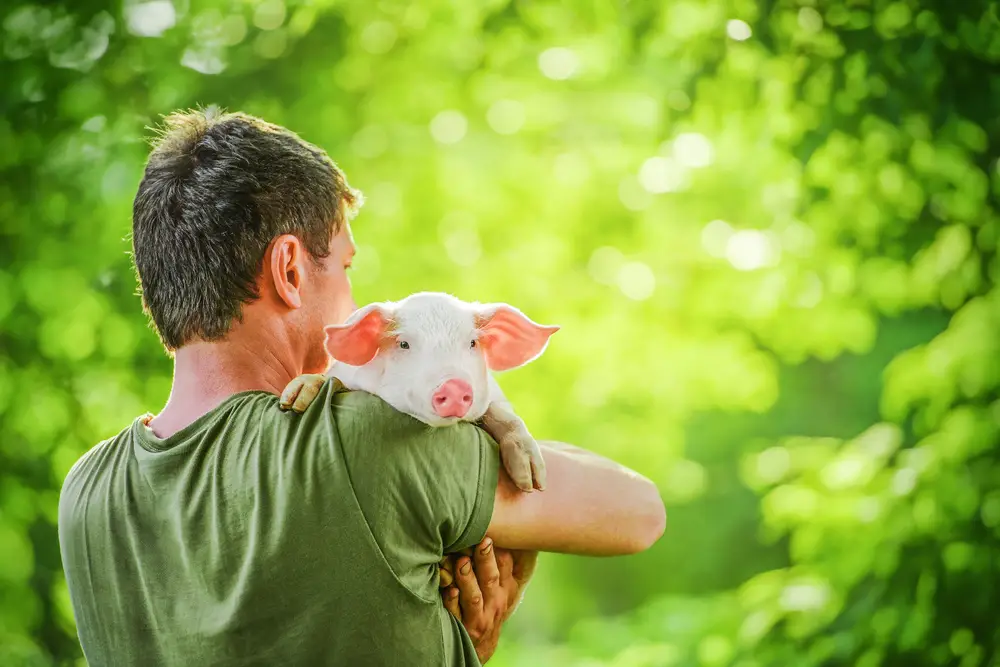1. They’re Prone to “Rooting” Behaviors

Rooting, or digging with their snouts, is a natural behavior for pigs, but it can wreak havoc on your home if not managed. Indoors, they may root around furniture, carpets, or blankets, so providing a designated rooting area is helpful.
2. They Need Plenty of Space to Roam
Pigs are active and curious animals, and they need ample space to explore and root around. A small apartment won’t cut it for most pigs; they need outdoor access, preferably with a yard to dig and play.
3. They’re Incredibly Intelligent
Pigs are highly intelligent animals—often compared to dogs or even young children. They learn tricks, routines, and commands quickly, which is great for training but also means they need mental stimulation to stay happy.
4. Training Takes Patience and Consistency
Pigs are smart, but they’re also strong-willed, so training requires patience. They respond well to positive reinforcement (like treats) but can be stubborn if they don’t see a benefit. Early training is key to building a well-behaved piggy.
5. Pigs Aren’t Always “Mini”
Despite what many breeders might say, there’s no such thing as a “teacup” or “micro” pig. Many pet pigs grow to be between 100 and 200 pounds, depending on genetics and diet. Be prepared for a pet that may be much larger than expected!
6. Pigs Can Be Territorial
Many pigs are protective of their space and food, especially as they mature. This territorial behavior is normal, but it’s something to manage and respect, particularly if you have young children or other pets in the home.
7. Their Diet Requires Special Attention
Pet pigs have unique dietary needs and can quickly become overweight if overfed. A proper diet includes specialized pig pellets, fresh veggies, and limited fruits as treats. Human foods and dog food are off-limits to prevent health issues.
8. Veterinary Care Can Be Hard to Find
Not all vets treat pigs, so finding a pig-savvy veterinarian nearby is crucial. Research in advance to locate a vet experienced in pig care, as they’ll need routine check-ups, vaccinations, and occasional hoof and tusk trimming.
9. Pigs Are Prone to Certain Health Issues
Obesity, arthritis, and skin conditions are common among pet pigs. Regular exercise, a proper diet, and monitoring their skin are essential to keeping them healthy. Also, pigs are sensitive to the sun, so sunscreen or shade is a must for outdoor time.
10. Socialization with Other Pets Is Not Always Easy
While some pigs get along with other pets, they may not always appreciate sharing their space with dogs, cats, or other animals. Pigs can be territorial, and their unique body language might not mesh well with other pets’ play styles.
11. They Can Be Noisy and Vocal
Pigs have a wide range of sounds they use to communicate, from grunts to squeals to “barking” when excited or agitated. While endearing, these sounds can be loud and may surprise new owners.
12. Pigs Can Be Destructive
Because of their rooting and chewing behaviors, pigs can be rough on a home. If left unsupervised, they might dig up floors, tear through drywall, or chew on furniture. Pet-proofing your space is a must if you plan to bring a pig indoors.
13. Pigs Thrive on Routine and Structure
Pigs love routine and can become anxious if it’s disrupted. Feeding, playtime, and sleep schedules help them feel secure and stable, so consistency is essential for a happy pig.
14. They Have Long Lifespans
Pigs can live 12-20 years, so owning a pig is a long-term commitment. Be prepared for the responsibility that comes with this level of longevity, as your pig will need care and companionship for many years.
15. Pigs Bond Strongly with Their Families
Once they bond with you, pigs can be incredibly affectionate and social. They may follow you around, seek cuddles, and crave attention. Their attachment is heartwarming, but it also means they require plenty of quality time with their humans.


